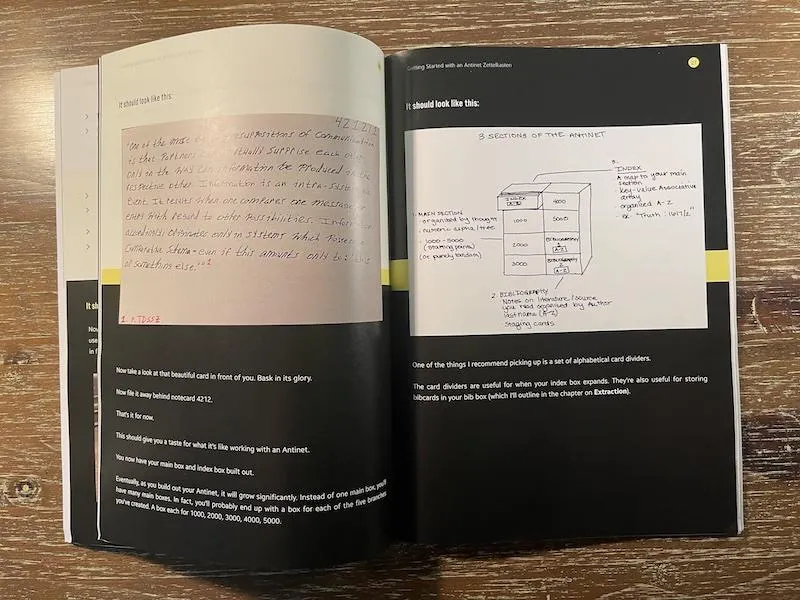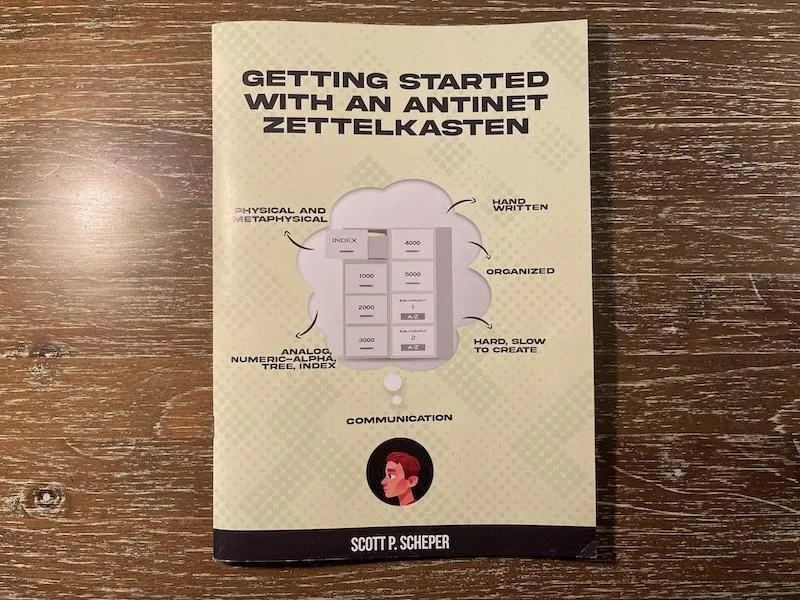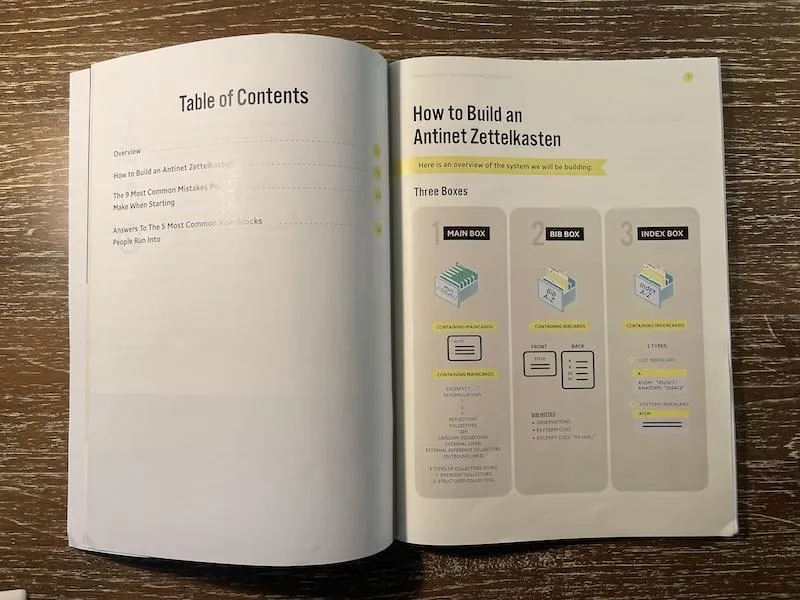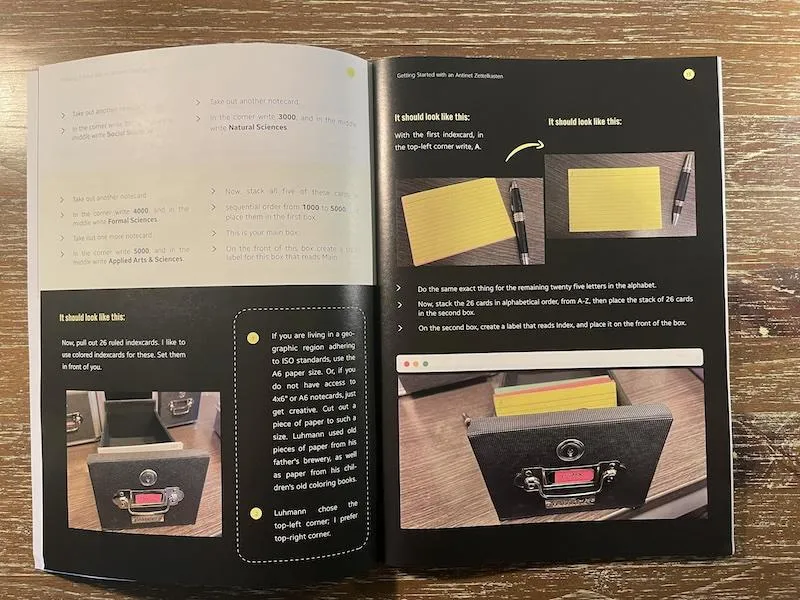63-Page Illustrated Zettelkasten Guide
How to Build a Zettelkasten Without Making Irreversible Mistakes
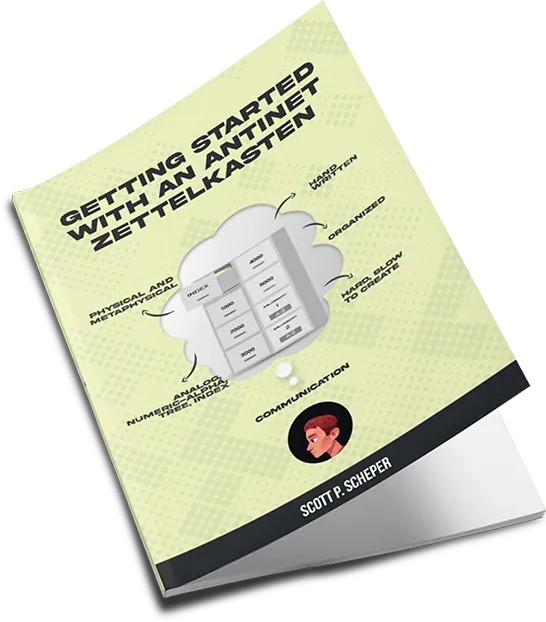
Get The Book For Pretty-Darn-Close-To Free!
Just Pay Shipping & Handling
Here's a Peek Inside The Guide
63-Pages of Zettelkasten Gold...
The Three Types of Boxes
You will learn about the three different boxes that comprised Niklas Luhmann's Zettelkasten. After outlining the different types of boxes, you will learn how to build out each one.
Each of these three boxes have distinct traits and are critical for building out a robust system that transforms into what Luhmann called his "alter ego" or "ghost in the box" (aka, a second mind).
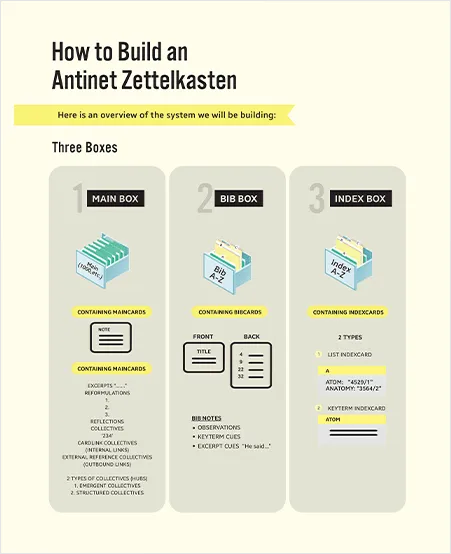
The Four Core Principles That Will Turn Your Zettelkasten Into a Communication Partner
You will learn the four core principles of the Antinet Zettelkasten. These core principles are what made Niklas Luhmann's knowledge system unique. In fact, Luhmann himself referred to these principles as "requirements."
You will be shown why each of these principles stands important, and just as critically, you will build out your Antinet Zettelkasten so that you can experience the magic behind the theory for yourself.
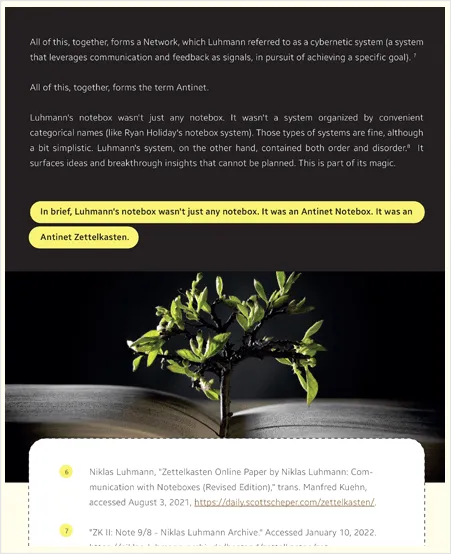
A Checklist of The Supplies You'll Need
The guide goes into explicit detail, starting with the supplies you need when starting out from scratch.
You will be taught everything starting with the sizes of notecards, the types of notecards, and the dividers you'll want to have when building your Antinet.
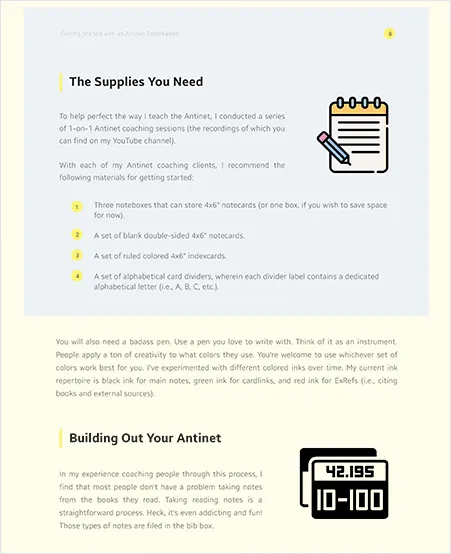
How to Take Reading Notes
You will learn how Niklas Luhmann took notes on the books he read. These cards are known as "bibcards" (short for "bibliography cards").
These types of notes act as "staging posts" for developing even deeper thought (in the form of main notes).
You will be shown how to create notes, and be shown pictures of what each type of note looks like.
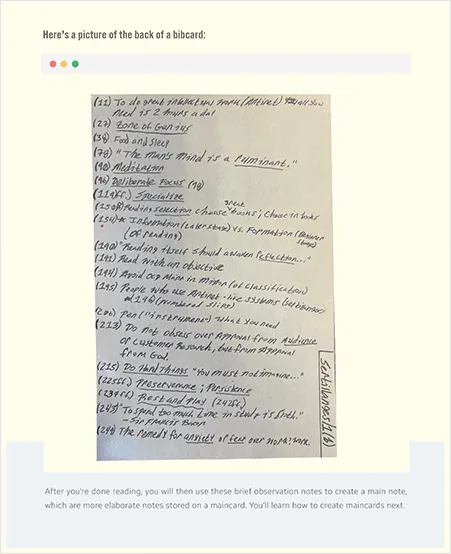

From:
Scott P. Scheper
Santa Margarita, California
Tuesday, 11:26 a.m.
Dear Friend,
I have no idea how you got to this page.
Maybe a friend told you about this crazy underground movement that has emerged around analog knowledge systems.
Maybe you got here by stumbling upon one of my popular YouTube videos.
Or, perhaps you ended up here by pure dumb luck.
It makes no difference, and here's why:
If you are someone who loves learning, research, or writing, then you have arrived at the most important website you will visit all year. Seriously!
Before I explain why, please allow me to introduce how it came to be…
Several years ago, I was a burnt-out depressed 35-year-old entrepreneur. I had just quit a cryptocurrency venture I co-founded and found myself single and alone (aside from my two cats, Brodus Maximus and Mr. Bigglesworth).
I was trying my hardest to connect my readings across the fields of psychology, philosophy, and marketing into a book.
I found myself really struggling to manage my knowledge between the same concepts that would emerge across different disciplinary fields. I wanted a system that would interweave my thoughts into one interconnected narrative so that I could write a book about it (without it being painful and taking a decade).
But honestly, here was the main problem: I had tried every tool out there for organizing my research (tools like Zotero, Scrivener, Notion, LogSeq, Roam Research, and Obsidian). Yet with digital tools, I ended up with an even bigger mess than just using pen and paper tools (like Moleskine notebooks and notecards).
However, even with pen and paper knowledge tools, it's almost impossible to search through, find and connect your thoughts.
Being that I couldn't find a good knowledge management system, I was faced with just giving up on the idea of connecting shared concepts I was spotting across the different disciplinary fields I was reading.
While this was unfortunate, it went even deeper than that. You see, it really meant giving up on the idea of writing a book that I felt called to write, and instead going back and doing work that I wasn't passionate about.
At that very moment, some divine force from the universe intervened. I began reading a book called How to Take Smart Notes, and I stumbled across a notebox system of a (now deceased) sociologist named Niklas Luhmann. This man, who the scholar Johannes Schmidt calls "the most important sociologist of the twentieth century," ended up writing 70 books and 600 peer-reviewed articles across many disciplinary fields. What's crazy is that Luhmann did this in only thirty years, and it seemed like his writing process was enjoyable!
Luhmann's system revolves around the idea that connecting ideas and writing prolifically comes from implementing a knowledge system called a Zettelkasten (German for slip box or notebox).
However, what I discovered was something just as critical, and it's something that even the author of How to Take Smart Notes seems to have overlooked: the power of using analog tools for thinking (instead of digital tools).
After my very brief exposure to Luhmann's Zettelkasten, it became crystal clear to me how to find and connect ideas using notecards (which was previously very difficult to do).
It seemed to make sense how Luhmann could write a fantastic book that connects concepts across many disciplinary fields (without experiencing the pain of writer's block or having books take decades to write). In fact, the knowledge using Luhmann's system can be combined to produce many more books over decades!
At this time, I grew excited and decided to devise a master plan. It started with building out my own analog Zettelkasten so that I could test if it's as powerful as the hype leads one to believe.
I decided to do this by reverse-engineering Luhmann's own Zettelkasten (thankfully, his notes have been digitized by the university he worked at). I did this by translating many of Luhmann's own handwritten notes from German to English and then writing out each note by hand. It took several months, but at least this way I could see how Luhmann's Zettelkasten really worked.
I then used these lessons and began applying them to my own research. I read several books spanning psychology, marketing, mythology and theology.
After that, I began using the notecards I created (which followed Luhmann's specific format), and I began writing daily essays. It made writing fast, fun, and effective. Plus, I was building richly-packed material that could be combined and used in other works for decades to come.
Building on this experience, I decided to publish YouTube videos and write a book about this powerful analog knowledge system. This way, others wouldn't have to learn what I had to learn the hard way (by reading misleading online articles, or several books that get it wrong, or even having to write out by hand the cards in Luhmann's own Zettelkasten).
Because of the misconceptions out there about Zettelkasten, I decided to refer to this system as the "Antinet" (i.e., the Antinet Zettelkasten).
I call it this because it contains an acronym ("ANTI"), which maps onto the four principles (or "requirements") Luhmann outlined when describing the system.
These four principles (which are outlined in the guide), are critical for building an effective analog Zettelkasten (one that becomes a 'second mind' with which you can communicate with).
With the Antinet Zettelkasten, I can now ingest books rapidly across many disciplinary fields, and all I need is a pen, notecards and my brain!
I can later find these notes very easily and then connect these ideas seamlessly. This makes it incredibly easy to write deep books without experiencing the pains of writer's block.
In six months of research, and three months of writing, I wrote the first draft of my book Antinet Zettelkasten (which came out to 190,000 words and over 500+ pages of deeply-footnoted, well-researched material).
The free guide on this page serves as a beginner's manual to building your own Antinet Zettelkasten. This system is very robust, and possesses an even deeper history (which my upcoming 500+ page book outlines in explicit detail).
Warm regards,
Your crazy compadre,
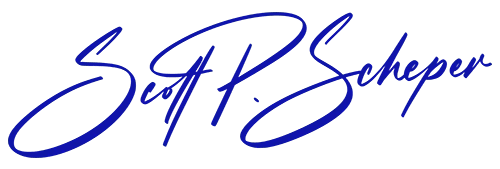
Scott P. Scheper
"The Analog Knowledge Revolutionary"

What's Inside The 63-page Guide...
How to Build an Antinet Zettelkasten
The 9 Most Common Mistakes People Make When Starting Out
The 5 Most Common Roadblocks People Run Into
The Antinet Zettelkasten is Game-Changing
Don't take my word for it—listen to what others have to say...


"Scott gave me direction for developing an analog Antinet like nothing else online. No one else has researched Luhmann’s ways and built them out better. Scott’s encouraging the analog way is as valuable as it is rare."
—Nathan Cheever, Data Scientist and Writer Who Covers How Societies Rebuild


"I wrote my first book when I was in graduate school; my second soon after, but nothing since. Now that I am about to retire, I feel that former stirring once again. Scott Scheper saved me from going down the rabbit hole of electronic knowledge management tools which celebrate capturing mountains of information while stifling creativity. Let Scott show you what he opened up for me: the magic of paper and pen as he provides an in depth exposition of the history and power of the finest assistant to the human brain ever developed: the Zettelkasten of Niklas Luhmann."
—Kathleen Spracklen, Computer Scientist, Linguist and Microcomputer Chess Pioneer


"The Antinet makes you more concentrated and it seams to evoke more thought associations. It has given me a new panache, made me read more and adds a bit of self-esteem and contentment about my use of time when I am not working. It makes you retain more information, see better the parallels between different thought-processes and sometimes correct or adjust ideas you had. I still have to learn and elaborate a lot, but in little details I see positive changes."
—Eduard De Bie, 67-year-old Physician from Belgium Who Uses His Antinet to Sharpen His Mind


I needed to write a thesis to become an expert in real estate law. With traditional personal knowledge management methods, I lost a lot of time trying to understand zettelkasten methodology and tweaking obsidian. Now, thanks to Scott and all the free content he putted online, I can easily focus on developing my knowledge and writing my thesis. The Antinet not only helped me write my thesis, but helped me with my other work, too. Scott showed me the direction of a journey that will last a lifetime...I hope!
—Erwann Laville, Legal Researcher and Writer located in France


I was drowning in information. I tried digital tools and I created a mess for myself. I prefer paper journals and thought that someone might be building an analog zettlekasten. I found Scotts videos, blogs and podcast. It changed what I thought possible. I now have a process for reading and developing knowledge from what I read. Now I get excited to spend time with my ANTINET. And I am close to launching my new podcast. Sober over 50.
—Terry Grier, Entrepreneur and Corporate Insurance Broker Who Uses His Antinet to Create Content About Sober Living Over the Age of 50


"I came across Luhmann's Zettelkasten in 2020, and, since then, I have been on a quest to better my thinking and writing. Unfortunately, in the digital world, Zettelkasten implementations fall short in many crucial fronts. Scott's Antinet Zettelkasten brings the focus to pen and paper, allowing you to focus on what truly matters: creating notes and producing intellectual output."
—Nikolaos Panaousis, Lifelong Learner and Thinker Who Uses His Antinet in Pursuit of Higher Education


"I stumbled on the Zettelkasten idea through YouTube and it seemed to be the thing I had been looking for all my life. But after several faltering attempts to start writing notes, first in Notion, then in Obsidian, I realized I needed som help. I found Scott, or rather, Scott found me (thanks YT algorithm), and as he introduced me to the hard way, the right way, it felt like turning a corner and finding El Dorado. Scott took me step-by-step through the process, and I don’t know that I could have made progress without him. As a result, my Antinet grows by the day, and I have several projects in the works that for years have only been dancing around in the nether regions of my brain."
—Steve Heimler, Founder of the Heimler's History YouTube Channel teaching 400,000+ Subscribers about AP History


"I've been wanting to write a comprehensive book on Creativity and Chaos for some time now. Between digital notes and paper notebooks, I couldn't find a lot of notes easily, much less a consistent thread for my ideas in so many places. I stumbled upon Scott on social media one day and saw him talking about the Antinet. I was hooked on the idea, and hired him immediately to show me his system. The Antinet was a game changer for me. I'm now consistently reaching my daily goals of writing with ease. Best of all, it's some of the best writing I've ever done, and I truly believe it's because his system encourages deep thinking and making interesting connections."
— Lane Watson, Life-long Creative and Writer Who Uses the Antinet to Think Deeply


"I was thrilled when I found out about Luhmann and his zettelkasten method on growing one's knowledge online. So of course after hours of youtube binging on zettelkasten methods all I found is setups videos after setups videos and but never really found the beef for it. It was until I saw Scotts clip on youtube on how he did it to grow his knowledge that I really have this "a-ha" moment with the zettelkasten method. He really put things into perspective to grow my knowledge!"
—Peter Lo, Software Developer from Thailand Who Uses the Antinet to Learn New Skills
I donate five percent of all profits to LittleFreeLibrary.org
I am a man on a mission to create an army of independent writers, creators, and thinkers who make a killer living.
Contact

+1 (949) 835-5125

30021 Tomas St, Suite 300, Rancho Santa Margarita, CA 92688

Mon. - Fri. 10 a.m. - 6 p.m. PT
Contact

+1 (949) 835-5125

30021 Tomas St, Suite 300, Rancho Santa Margarita, CA 92688

Mon. - Fri. 10 a.m. - 6 p.m. PT

